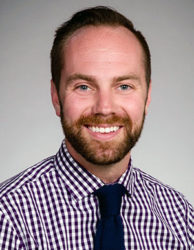
Dr. Cameron Randall of the University of Washington School of Dentistry and his colleague, Dr. Daniel McNeil of the University of Florida, are continuing to illuminate the ways in which multidisciplinary research can benefit oral health.
The two served as guest editors for a recently released special issue of the journal Community Dentistry and Oral Epidemiology titled “Advancing the Behavioural and Social Sciences to Promote Oral Health.” This special issue expands on their award-winning 2022 consensus statement which called for continued and improved applications of behavioral and social science to maximize oral health for all.
The new special issue is the culmination of a project spanning more than two years, and it is the largest issue in the journal’s history. Its intent was twofold: to serve as the published proceedings of the 2020 Behavioral and Social Oral Health Sciences Summit and to extend the leading-edge presentations and panel discussions that took place at the historic event.
“The consensus statement affirmed the importance of behavioral and social science for impactful oral health research, and it laid out specific priorities for future work in the area,” said Dr. Randall. “Building on the consensus statement, the special issue provides essential background on key topics, offers an introduction to contemporary theory and research methodology, features examples of cutting-edge science, and highlights urgent issues such as oral health inequity and approaches for addressing those issues. In that way, the articles in the special issue suggest how to do the necessary future work.”
By using the special issue to present historical perspectives, summit proceedings, suggestions for achieving the goals laid out in the consensus statement, and additional content, Drs. Randall and McNeil hope the field will continue to blossom.
“It’s been an honor to be part of this collaborative international initiative to shape how behavioral and social science will be applied to dental and oral health research into the future,” said Dr. Randall. “It’s a privilege to work with a community of scholars and other stakeholders who are committed to a common goal: ensuring good oral health for all through contemporary and high-quality multidisciplinary research.”
The special issue’s concluding article summarizes ways in which the current discourse and work in the field can grow. Some of the next steps in the field include continuing the behavioral and social research aimed at improving oral health by drawing on suggestions presented in the special issue, as well making good use of the results through research translation, implementation, and policy change.
“I’m grateful to those who laid the groundwork for that over the last several decades, and I’m excited and hopeful about the future,” said Dr. Randall. “At the same time, many questions remain unanswered, and many problems remain unsolved. So, we have a responsibility to continue the work in a focused way, and anyone who is interested is invited to help build on this momentum.”